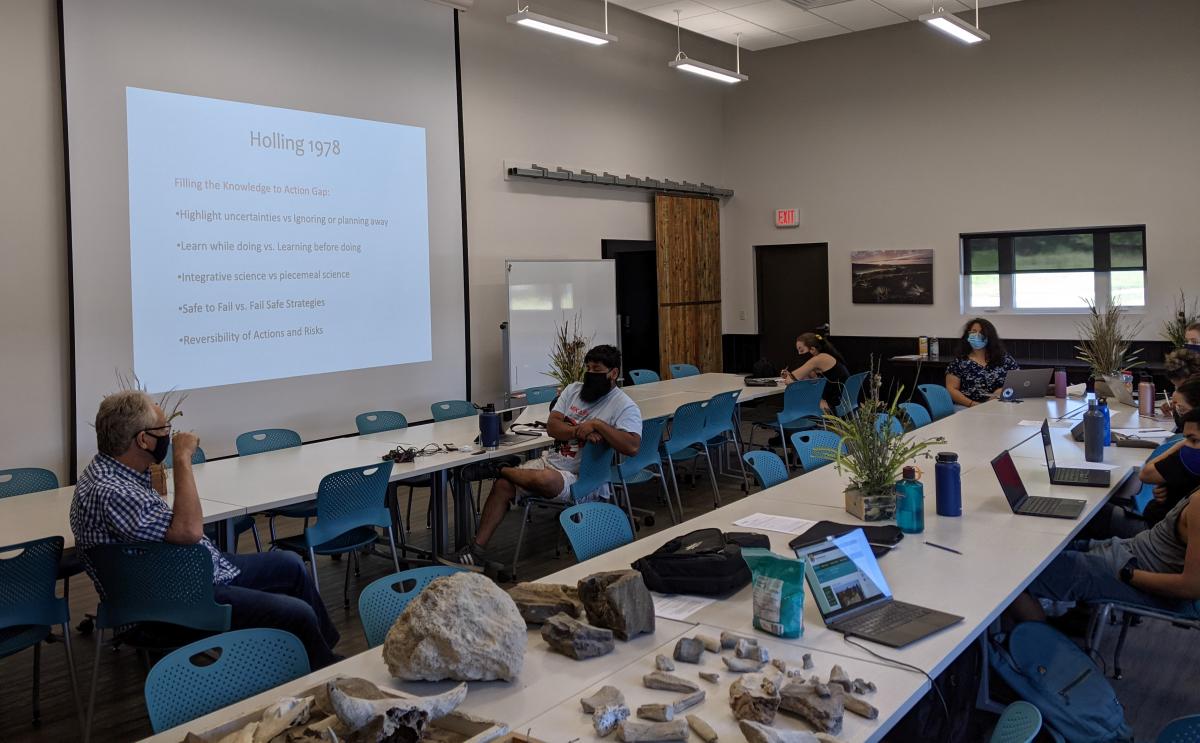
All NRT students must fulfill the requirements of their home departments and fulfill the requirements of the NRT program to retain funding. As a graduate student, you should monitor your progress on your degree milestones as listed on the Office of Graduate Studies website. This site also provides the forms and deadlines critical to your degree program. You should set an appointment with your advisor in your home department to choose courses in your department while meeting the following requirements of the NRT program.
Required NRT Coursework
- Foundations of Ecological Resilience—core course offered every even year in the fall (1 semester, 3 credits, NRES 902)
- Resilience in Complex Systems—core course offered every odd year in the fall (1 semester, 3 credits, NRES 903)
- Pathways course elective in a discipline outside your major (required to take a 1-semester course for 3 credits)—may take 2 courses for 6 credits. Below are the recommended courses. Be in discussion with your advisor about other courses that could serve as a pathways course.
- Pathways to Agriculture and Natural Resources for nonmajors:
Agroecology (AGRO 835)
Great Plains Ecosystems (AGRO 840)
Hydroclimatology (NRES/BSEN 879) - Pathways to Social Sciences for nonmajors:
Core Seminar in Public Policy and Process (POLS 831—available fall term only)
Environmental Law (AECN 856)
Resource and Environmental Economics II (AECN 865)
Public Policy Analysis Methods and Models (POLS 836) - Pathways to Engineering and Computer Science for nonmajors:
Introduction to Informatics (CSCE 100/890)
Computer Science I: Informatics Focus (CSCE 155T/890)
Data Modeling for Systems Development (CSCE 411/811)
Introduction to Data Mining (CSCE 474/874)
Multiagent Systems (CSCE 475/875)
Introduction to Machine Learning (CSCE 478/878)
- Pathways to Agriculture and Natural Resources for nonmajors:
- Minicourses—must take 3 (courses generally run 2-4 days and count as 1-3 credits). Below are recommended minicourses. Be in discussion with your advisor about other minicourses that could be an option.
- Applied Adaptive Management (NRES 896)
- Multiagent Simulation for Complex Systems (CSCE 890)
- Decision Making and Attribution Science (BSEN 892 and NRES 898)
- Communication, Conflict Resolution, and Leadership (NRES 881)
- Community Engagement (CDEV 818)
- Governance and Policy
- Certain pop-up journalism courses such as "Visualizing Floods"
- Montana short courses such as "Science Communication"
Other Required Activities
- Weekly meeting (one workday every week in the NRT lab to collaborate and develop your research and ensuing products—this includes a biweekly one-hour meeting with the program coordinator, other students and any available professors to present and discuss research progress)—year-round
- An annual NSF meeting—two students chosen each year (3-4 days in another state)
- An annual NRT meeting, retreat or boot camp, usually in the summer (1-2 days each year)
- The water tour/field trip every year (in the spring or summer—2 weeks when in Nebraska, 3 weeks when in The Netherlands and Western Europe—MSYM 892)
- The water law conference (1 day each year)
- A seminar series (1 set of lectures to attend over the duration of your program, for a total of 4-12 hours)
- The “Biomedical RCR (Responsible Conduct of Research) Basic" course available through citiprogram.org at https://about.citiprogram.org/en/series/responsible-conduct-of-research-rcr/ (½ day)
- For Ph.D. students: a grant-writing workshop (1 day) or Preparing Future Faculty series (about a semester)
- By the end of their first semester, students should have both their major advisor from their primary department and a coadvisor from another academic unit on record.
- By the end of their first year, students must turn in a proposal for their thesis or dissertation.
- Master's students will present about their project to the rest of the NRT at the end of their first year; Ph.D. students will present to the NRT at the end of their first and second years.


